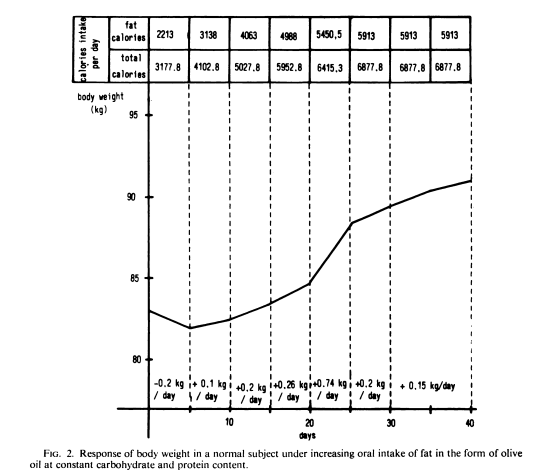Effect of overeating

Seigla
Posts: 172 Member
Say you burn 2500 calories in a day, but you eat 4000. Will your body be able to store all of those 1500 excess calories as fat and thus can you gain 200 grams in a day? What is the limit of weight gain in a day?
0
Replies
-
it'll store some as glycogen too, especially if the intake is high in carbohydrate. Overfeeding studies of +40% excess calories show an increase in calorie expenditure as well as weight gain.
http://ajcn.nutrition.org/content/62/1/19.full.pdf reports about 0.4 kg/day (1 lb/day) in the first 7 days of carbohydrate overfeeding.0 -
Interesting points and article. Gaining 0.4 kg/day is a lot!
From the article:
Carbohydrate overfeeding produced progressive
increases in carbohydrate oxidation and total energy expenditure
resulting in 75-85% of excess energy being stored. Alternatively,
fat overfeeding had minimal effects on fat oxidation and total
energy expenditure, leading to storage of 90-95% of excess energy.
Excess dietary fat leads to greater fat accumulation than does
excess dietary carbohydrate, and the difference was greatest early
in the overfeeding period.
So not all excess energy is stored and it also depends on what you eat (carbohydrates/dietary fat).0 -
On a theoretical level it's an interesting discussion
On a practical level as it relates to your individual weight loss .. Don't get bogged down in the detail it will not help. Weight loss isn't linear .. just accept that if you eat over your maintenance level consistently over time you will gain weight, if you eat under consistently over time you will lose
consistently over time includes some days over and some days under but averaged over time
0 -
Thanks rabbit, excellent point to distinguish between the theoretical and the practical part. I am interested in both parts, but since I am losing weight my main interest is in the practical part.
What I always think when I have a day of overeating (happens every 10 days or so) is that it's also good for my metabolism; consistently eating too few calories can reduce this metabolism. I also notice that when I have eaten a lot the previous day, I don't need to eat so much the next day. I think this has to do for a big part because of motivation; if I allow myself to eat too much sometimes, then I maintain my willpower to lose. If I consistently eat too few calories, my motivation will become lower and lower. "Cheat days" help me to increase this motivation again (significantly). I used intermediate fasting to lose weight and it has been very useful.
I agree with you, weight loss isn't linear and it's based on eating below maintenance level consistently over time ; on average, allowing for extremes.
Still I sometimes feel bad after eating too much, but I shouldn't; it is necessary for the process (due to the reasons given above).0 -
About 150 of those additional calories will be burned up digesting the additional food (the increase in metabolism?). But the rest will eventually be stored.0
-
I feel like the limit would be the amount your body can physically ingest. I mean, if you set about stuffing your face to see how many calories it's possible to consume, eventually you're body will be like 'nope' and you'll either throw up or just physically not be able to put any more food into yourself, right? I mean, I always figure that if the calories make it through your digestive system, they're gonna get processed.0
-
lemonlionheart wrote: »I feel like the limit would be the amount your body can physically ingest. I mean, if you set about stuffing your face to see how many calories it's possible to consume, eventually you're body will be like 'nope' and you'll either throw up or just physically not be able to put any more food into yourself, right? I mean, I always figure that if the calories make it through your digestive system, they're gonna get processed.
Perhaps the digestive system also has a maximum capacity, so that the excess food does get processed, but not as thoroughly - and perhaps mechanisms to get rid of excess calories. I know that one of the components of pee is sugar. Perhaps more sugar is released if you overeat.
But from an evolutionary standpoint releasing excess calories is not so smart; the body has evolved to hold on to it's calories, especially at the times when they are available in large amounts, so that it can build a reserve for when difficult times come. So probably it holds on to most calories.0 -
Fat absorption in the human body isn't 100% but is well over 90%, taking in a lot more fat results in a bit more "leakage" but weight gain also occurs

0 -
"I know that one of the components of pee is sugar. Perhaps more sugar is released if you overeat."
Nope. You won't pee out extra sugar unless your a diabetic experiencing an episode of high blood sugar. In healthy people insulin enables the sugar to be metabolised normally.0
This discussion has been closed.
Categories
- All Categories
- 1.4M Health, Wellness and Goals
- 395.3K Introduce Yourself
- 44.1K Getting Started
- 260.6K Health and Weight Loss
- 176.2K Food and Nutrition
- 47.5K Recipes
- 232.7K Fitness and Exercise
- 445 Sleep, Mindfulness and Overall Wellness
- 6.5K Goal: Maintaining Weight
- 8.6K Goal: Gaining Weight and Body Building
- 153.2K Motivation and Support
- 8.2K Challenges
- 1.3K Debate Club
- 96.4K Chit-Chat
- 2.5K Fun and Games
- 4.2K MyFitnessPal Information
- 16 News and Announcements
- 1.3K Feature Suggestions and Ideas
- 2.9K MyFitnessPal Tech Support Questions



